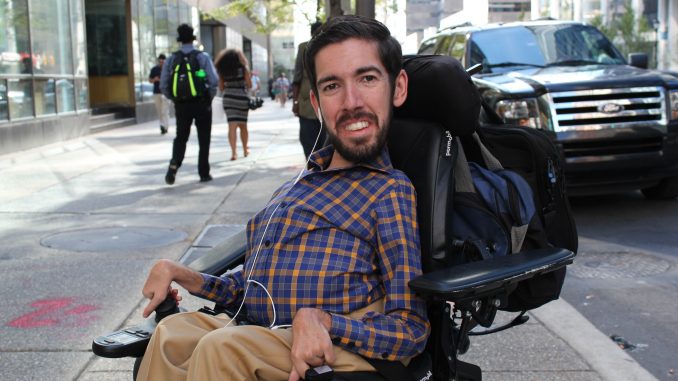
Every day, Jimmy Curran wakes up and heads to work at his full-time job in Center City. During his free time, he goes to bars with his friends.
Curran is a normal 27-year-old. His daily life isn’t one of inspiration.
“I want people to say, ‘Oh, Jimmy is just like me,’” said Curran, a 2011 finance alumnus.
Curran relies on a wheelchair to get around because he was diagnosed with spinal muscular atrophy. After Curran finished his time as an undergraduate, he would only get as far with potential employers as an initial interview.
Curran founded [dis]ABLE, a clothing line with a mission: to rid the stigma of what it means to have a disability.
“I was having a hard time with employers seeing past my disability,” Curran said.
In the fall of his senior year at Temple, Curran went through almost 30 interviews with no job offer. With some help from men’s basketball coach Fran Dunphy, who he met from attending basketball games and being friendly with players on the team, Curran landed a job at Independence Blue Cross a few months after he graduated.
“After the obstacles I encountered in my job search, I realized society had substandard expectations [for those with disabilities],” said Curran, who still works for IBC.
Curran said he thinks society expects those with disabilities to be unable to perform everyday tasks, like holding a job and maintaining a social life. He said people are often impressed that he can go to the grocery store by himself, just because he has a visible disability.
Regardless of these expectations, Curran said he wasn’t going to let his disability get in the way of achieving his fullest potential.
[dis]ABLE was born from these values.
“Everything the brand stands for, I believe in,” Curran said.
The logo, designed by Curran, pictures the word “disable” with “dis” crossed out and the “able” in caps. Underneath it reads: “For all those who said I couldn’t.”
The first shirt was printed in September 2013. Curran wanted help with the line, so he enlisted the help of his close friend Eddie Doyle and his brother Mike Curran.
Doyle said he believes everyone can apply the message of [dis]ABLE to his or her life, regardless of a visible or concealed disability.
“No matter who you are, you’re going through something,” said Doyle, a 2010 communications and media studies and production alumnus. “The idea behind [dis]ABLE is to not let it break you down. You have the decision on how to handle those obstacles.”
Mike Curran said he recognizes the fearlessness his brother has in the brand.
“For any startup or business, it takes a lot of guts to have that kind of ownership to show up [to an event] and push a brand,” Mike Curran said.
“We’ll be anywhere, whether it is the Continental or a Sixers game, and Jimmy will have his backpack full of shirts, ready to tell people about the brand,” Doyle said. “He’s always ready to be himself. He’s not afraid of getting rejected.”
The main goal of [dis]ABLE is to stop viewing people with visible disabilities as subjects of inspiration. Mike Curran and Doyle said they both agree that what makes Jimmy Curran inspirational is his determination, positivity and the insight he adds to every conversation, not his wheelchair.
“We’re not different,” Jimmy Curran said. “I don’t want people to say ‘Jimmy is amazing.’ I want people to think ‘I gotta wake up and go to work,’ and Jimmy is probably going to do the same. I want to inspire people to view everyone as a person.”
Shealyn Kilroy can be reached at shealynkilroy@temple.edu.


Be the first to comment